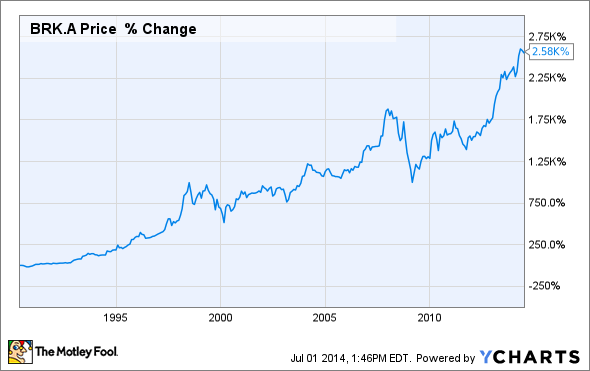Both our operating and investment experience cause us to conclude that 'turnarounds' seldom turn, and that the same energies and talent are much better employed in a good business purchased at a fair price than in a poor business purchased at a bargain price. -- Warren Buffett, 1980
There's a very good reason why J.C. Penney (JCPN.Q) and other "turnaround" stocks have not found their way into Berkshire Hathaway's (BRK.A -0.76%) (BRK.B -0.69%) portfolio. After a few disappointing experiences with struggling businesses early in his career, Berkshire Hathaway CEO Warren Buffett realized that investing in turnarounds was just a waste of energy.

Warren Buffett eventually realized that investing in turnarounds was a waste of time
Investors in J.C. Penney would be wise to heed Buffett's wisdom. A large number of "value" investors have piled into J.C. Penney stock in recent months, driving the stock price up from a multi-decade low below $5 to more than $9. Yet J.C. Penney remains unprofitable -- and if you believe Warren Buffett, it may never be fixed.
Buffett's turnaround allergy
Investors are usually attracted to turnarounds because shares of struggling companies tend to be cheap. Indeed, Warren Buffett's most famous acquisition -- Berkshire Hathaway -- was bought as a turnaround play at a big discount.
When turnarounds succeed, the gains can be extraordinary. It's not uncommon for investors who time a turnaround correctly to make 5-10 times their money or more in a few years. However, Buffett would caution that for every successful turnaround story, there are many more turnaround candidates that either limp along or quickly spiral into bankruptcy.
If there were no other way to make money in the stock market, perhaps it would still be worth it for investors to gamble on turnaround plays. However, Warren Buffett has shown that a skilled investor can find multi-baggers in the making without taking on the risk of failed turnarounds. Berkshire Hathaway shares have skyrocketed more than 2,500% in the last 25 years.
Berkshire Hathaway Stock Chart, 1990-present: data by YCharts
One of Buffett's secrets to success was realizing that he was better off putting effort into finding businesses with the strongest moats rather than trying to guess which corporate turnarounds were likely to work.
Speaking from experience
Buffett's impatience for turnarounds was already solidified by 1980. His inability to turn around Berkshire Hathaway's textile operations during the 1960s and 1970s played a big role in shaping this philosophy. Buffett bought Berkshire Hathaway for well below book value, and eventually bought another struggling textile business (Waumbec Mills) for pennies on the dollar.
Berkshire's textile operations notched several years of profitability during the 1970s. However, every "turnaround" was soon followed by another crisis. Both before and after the acquisitions, the Berkshire Hathaway textile business was in a cycle of "one step forward, two steps back," leading slowly but surely to persistent losses.
J.C. Penney -- just another turnaround candidate
Many investors were enthusiastic about J.C. Penney's most recent earnings report. The company reported a 6.2% increase in same store sales, a higher gross margin, and lower operating expenses. J.C. Penney expects a continuation of these trends throughout 2014.
To some extent, investors' excitement makes sense in light of these improving trends. However, despite the sales and margin improvements, J.C. Penney still lost $344 million before taxes on sales of $2.8 billion. That's a double-digit negative profit margin!

J.C. Penney lost hundreds of millions of dollars last quarter despite its sales rebound
If J.C. Penney maintains its current sales growth and margin improvement trajectories, it would take several years to return to profitability. Yet there is no guarantee that J.C. Penney can maintain this momentum. Warren Buffett learned this lesson the hard way: Berkshire Hathaway's textile business had a few promising years, but the improvements were never sustainable.
In fact, much of J.C. Penney's improvement last quarter can be attributed to its terrible performance the year before. It was simple for J.C. Penney to look good going up against such easy comparisons. However, there's little evidence that J.C. Penney is attracting new fans (as opposed to getting back some of the customers it lost), which bodes ill for its long-term prospects.
Foolish final thoughts
Warren Buffett learned the hard way that it's tough to predict whether a struggling business can be saved. (So did I.) You don't have to.
Rather than struggling to identify the turnaround candidate that's going to make you rich -- and perhaps losing a boatload of money along the way -- Warren Buffett would tell you to spend your time looking for truly great businesses. These companies can become big winners in your portfolio, without any of the risk of owning troubled businesses.





